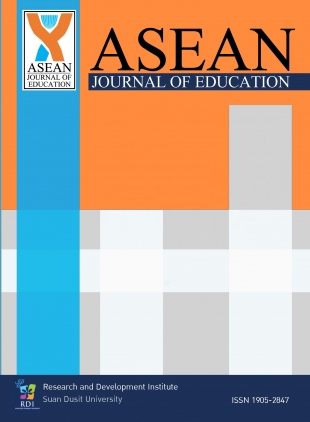Game-Based Learning Innovation to Development of Analytical Thinking Ability
Keywords:
Game, Game-based-learning, Innovation, Analytical thinking abilityAbstract
As global trends have changed, the pattern of game-playing has adapted. It is transitioning from single-player or multiple player game and playing with friends or indeed strangers. The opportunity exists to leverage educational innovation to harness game-play in a constructive curriculum grounded manner through “Game-Based Learning”. This, through various simulations, encourages students to play and learn simultaneously. Critically, this will not only create a new learning environment grounded in academic principles and curricula but facilitate learners honing more important analytical skills which are the bedrock of all forms of advanced thinking. In employing such a pedagogical approach, teachers in designing game-based learning are advised to gain a clear understanding of its characteristics before applying it to the teaching curriculum. Two evident alternatives exist, bespoke games designed by the teacher and learning games already available. In building a learning game, teachers should be mindful to give explicit attention to the learning goals and outcomes sought in developing such games to enhance the benefits to students and thus engender a positive and efficient learning conjunct to traditional teaching methods.
References
Byun, J. H., & Loh, C. S. (2015). Audial engagement: Effects of game sound on learner engagement in digital game-based learning environments. Computers in Human Behavior, 46, 129-138.
Chumwuttisak, K., & Silanoi, L. (2015). The developing grade 5 students’ analytical thinking skill and attitude towards democratic citizenship in the learning unit on “Good citizen in a democracy” of Social Studies S15101 Course, using game-based learning. Journal of Education Khon Kaen University, 38(4), 177-184.
Cojocariua, V. M., & Bohian, I. (2014). Teaching the relevance of game-based learning to preschool and primary teachers. Procedia-Social and Behavioral Sciences, 142 (2014). 640-646.
El-Said, M., & Mansour, S. (2008). Game based learning creating a triangle of success: Play interact and learn. International Journal Intelligent Games and Simulation, 5(2), 26-32.
Johnson, L., Smith, R., Willis, H., Levine, A., & Haywood, K. (2011). “The 2011 Horizon Report”. Retrieved 2019, August 12, from http://net.educause.edu/ir/library/pdf/HR2011.pdf
Khemmanee, T. (2018 . Teaching Science - body of knowledge to manage effective learning process. (22nd Eds. . Bangkok: Chulalongkorn University Press.
Laowreandee, W., Kitrungraung, P., & Sirisamphan, O. (2017). Active learning instructional strategies for thinking development and educational improvement of the 21st century. (12th Eds.). Nakhorn Pathom: Phetkasem Printing Group, Co., Ltd.
Lertwittayakul, T. (2017). Formative evaluation of learning by game-based, College of Asian Scholars Journal, 7 (Special), 104-116.
Marzano, R., & Kendall, J. (2007). The new taxonomy of educational objectives. (2nd Eds.). Retrieved 2017, Jan 21, from https://wiki.adams50.org/.../f/f9/Bprtc/Marzano_taxonomy_verbs.pdf
Panich, V. ( 2014 . Ways to create Learning skills for students in the 21st century. Bangkok: The Siam Commercial Foundation.
Pasin Tangjuang, (2011). Educational personal competencies development model. Bangkok: Duangkamol Publishing.
Pho, A. and Dinscore, A. (2016). Game-based learning. Retrieved 2019, August 3 from http://www.ala.org/acrl/sites/la.org.acrl/files/content/aboutacrl/directoryofleadershipsections/is/iswebsite/projpubs/tipsandtrends/spring2015.pdf
Prachuablarp. (2016), Game-based learning with nursing lessons development, Journal of Nursing Division, 43(2, 127-136.
Puthyrom, T, Suwanna S., & Suriyong. L. (2017). A game-based learning approach to improve students’ learning achievement in data flow diagram course. Phranakhon Rajabhat Research Journal (Humanities and Social Sciences), 12(2), 1-9.
Ratdee, S. (2009). A comparison of learning outcome on Mathayomsuksa III students’ achievement on learning a compound words through games and the conventional method for Mathayomsuksa III students of Demonstration School, Thepsatri Rajabhat University, Lopburi. (Master’s thesis, Srinakharinwirot University). Srinakharinwirot University databased.
Sinlarat, P. (2015). Thinking Science. Bangkok: Dhurakij Pundit University Press.
Sriharee, G. (2018). Software engineering prospective on digital game-based learning for Thailand Education 4.0. The Journal of King Mongkut’s University of Technology North Bangkok, 28(2), 477-488.
Soflano, M., Connolly, T. M., & Hainey, T. (2015). An application of adaptive games- based learning based on learning style to teach SQL. Computers & Education, 86: 192-211.
Southammavong, S. (2014). A study of third year college students’ analytical thinking skill in 703 IM 433 Geographical Course by Using 5Es Learning Cycle At Ban Keun Teacher College, Lao PDR. (Master’s thesis, Khon Kaen University). Khon Kaen University databased.
Suksiri, S. (2007). The study of effectiveness of game based learning approach. (Master’s thesis, National Institute of Development Administration). National Institute of Development databased.
Susoarat, P. (2013). Thinking development (5th Eds.). Bangkok: 9119 Technic Printing Co., Ltd.
Thatthong, K. (2011). Teach how to think: Learning management for thinking development. Nakhon Pathom: Phetchakasem Printing.
The Royal Society of Thailand. (2012). The royal institute dictionary of Educational Science. Bangkok: Arun Printing.
Trybus, J. (2014). Game-based learning: What it is, why it works, and where it’s going. Retrieved 2015, March 4, from http://www.newmedia.org/game-based-learning-what-it-is-why-it-works-and-where-its-going.html
Yamkuan, L., & Niwattanakul, S. (2017). The using of game-based learning for promote Mathematics process skills of 6th grade students. Journal of Information Science And Technology, 7(1), 33-41.
Downloads
Published
How to Cite
Issue
Section
License

This work is licensed under a Creative Commons Attribution-NonCommercial-NoDerivatives 4.0 International License.
1 All articles will undergo a formal peer-review. A panel of experts from within or without the university will examine the article; approval from a minimum of two experts is required for publication. Revisions posed by the experts must be completed by the research prior to publication.
2 Once published in the ASEAN Journal of Education, the article becomes intellectual property of Suan Dusit University. Duplication, in full or part, requires permission from Suan Dusit University.
3 Excluding errors incurred during printing, author(s) are responsible for the content of their articles.






